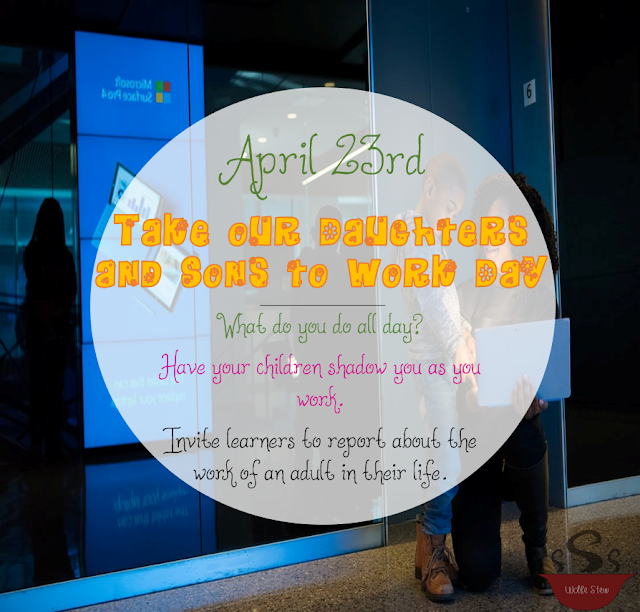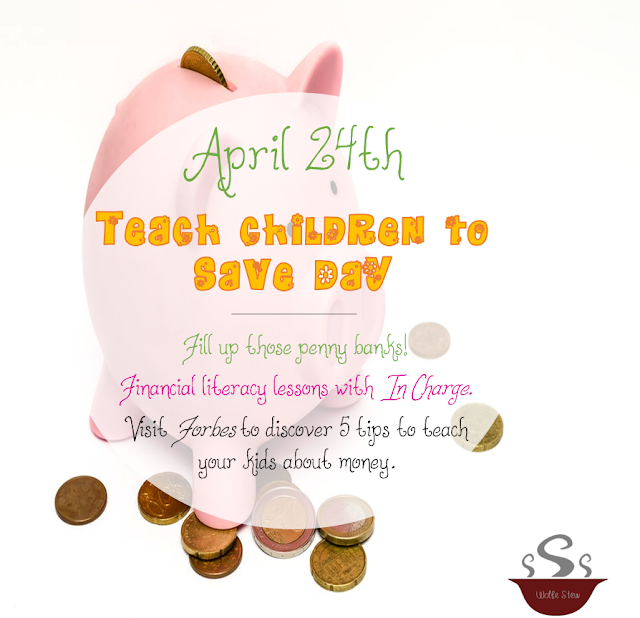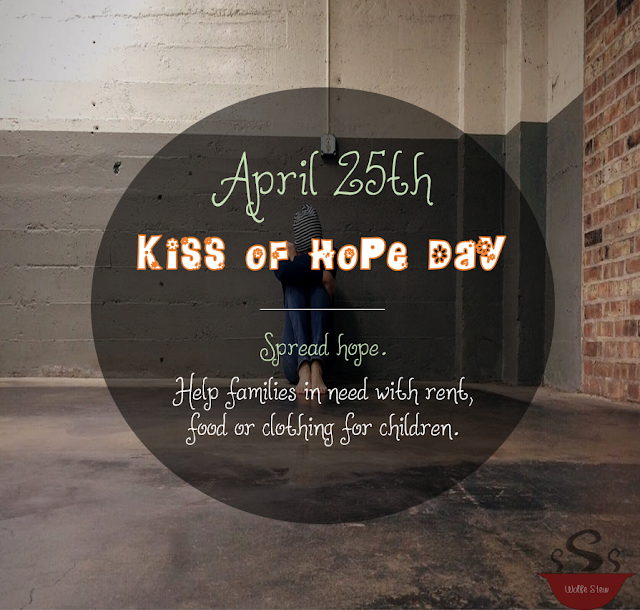April 2020: Week 4 | Ideas for Every Day
(Updated 4.21.2023)
With Easter behind us, some might wonder, “What else could
we possibly celebrate in April?” Well,
folks, we have some ideas. But, before
we get there, we want to make sure you’ve seen all our April ideas. Check out all the ways we’re serving up our ideas
for every day:
- As a calendar. On this calendar you’ll find ideas for every day in April with complementary link pairings. Perfect for advance planning or if you desire the entire smorgasbord of ideas.
- Week-by-week. We post a weekly blog for those of you who plan a week in advance, prefer going to a webpage instead of downloading a calendar, or desire more detailed information before investigating other pages. Read our weekly ideas for every day blogs here: April Week 1, April Week 2, and April Week 3.
- More ideas. We’re pinning more thoughts on our Pinterest board if you’d like even more ideas for every day.
And now, friends, read on to find a few ways to celebrate
every day with your learners during the fourth week in April.
April 19th - Hanging Out Day
I mean, the very idea behind hanging out day is to just
relax and do what comes naturally to you. No expectations, no appointments, just chill. Do what you enjoy doing. Play a game, watch movies, read books, break
out a jigsaw puzzle (I’ve heard those are popular right now), but most
importantly – take it easy.
April 20th – Look Alike Day
Imagine your whole family, or class, wearing the same outfit
today - talk about solidarity! Or pair
up and have a contest. Phone a friend
and dress the same, then meet up virtually. Then again, it’s not twin day, so you could choose a person you admire
(real or imaginary) and dress up like them. Don’t forget to take a picture; this is sure to make a lasting memory!
April 21st – Library Worker Day
You know, I’ve really missed going to our local
library. Often, I find myself thinking
of going there to check out a book and then remember it’s closed. So, imagine my surprise when I visited their
website today and noticed a complete transformation. Friends, these library workers don’t
stop. They have the widest,
most-organized selection of high-quality digital resources I think I’ve yet to
come across. The American
Library Association recently changed the theme of Library Appreciation Week
from “Find Your Place at the Library,” to “Find the Library at Your Place,” and
that’s exactly what I found when I visited my library’s website. So, if you haven’t already, I encourage you
to do the same.
With all the work these library workers are doing, let’s
spread the love. Nominate your favorite
library worker here.
Invite your learners to practice being a library worker by
having them arrange a set of books in alphabetical order. To modify this activity: 1) make sure every
book starts with a different letter 2) choose a few books that start with the
same letter 3) choose books that all start with the same letter.
Or, your Third to Eighth Grade learner could
always learn about the Dewey Decimal System with this lesson at Education World. Your learner's task is to help Huey and Louie, two boys that
made a terrible mess at the library, return the library to order. In order to do so, they’ll need to
familiarize themselves with the Dewey Decimal System using online tools. Included, for the leader’s convenience, is a
worksheet and answer key.
April 22nd – Earth Day
Today we honor the one thing we all share – the earth. To celebrate, make a seed
ball with Buggy and Buddy. Essentially, you’re molding recycled paper into shapes with embedded
seeds to then plant outdoors or gift to loved ones. The paper, once planted, acts as a growing
medium for the seeds. Buggy and Buddy
suggests pairing this activity with the book, The Great Paper Caper by
Oliver Jeffers. Hear it read aloud on YouTube.
Discuss
carbon footprints with Kitchen Counter Chronicle. First, you’ll define carbon footprint. Then, brainstorm ways to reduce carbon
footprints. Finally, paint your
learner’s foot and stamp it in the middle of a poster board. All around the footprint, they’ll list the actions they can
perform to reduce their carbon footprint. Having stamped their foot on it, they are now ready to sign their name
to it. Babalisme offers a printable Earth Day
Pledge where learners write what they will and will not do to treat our
earth with care.
With Rainy Day Mum, investigate the effects of plastic bags
on marine animals by constructing a plastic bag jellyfish
after reading, Follow the Moon Home. Follow the Moon Home, by Phillipe Cousteau and Deborah Hopkinson,
discusses the plight of plastic on sea turtles and how children can advocate
for them. Access a read aloud via YouTube. Or, Hoopla hosts an eBook version, which your
local library may enable you to access.
April 23rd – Take our Daughters and Sons to Work Day
In reality, the only safe way we can do this right now is if
you are currently working from home. If
that’s the case, your learner is likely already learning more about what your
job entails; but, today, invite them to discover more. Intentionally invite them into your day. Show them the intricacies of your job, invite
them to ask questions and explore. Then,
at the end of the day, talk about it. Does your career seem like a career field of interest to them? What attracted them to or detracted them from
it? What surprised them most about what
you do all day? Then, have them
independently reflect on their experience in one of the following ways:
- Preschool to First Grade: Draw a picture, using this template from Growing Little Leaves, that represents you at work. (The preceding link directs you to a PDF document, which may result in a warning message. If you’d rather, click this link, and scroll down to the thumbnail entitled, “Ancestor Jobs Worksheet.”)
- Second and Third Grade: Interview family members to complete a career family tree from Breit Links. (The preceding link opens a PDF, which may result in a warning message. If you’d rather, click this link, then scroll down to the career family tree link.)
- Fourth through Sixth Grade: Write a reflection that describes what job they would consider working. Compare and contrast it with what the parent they spent the day working with already does.
April 24th – Teach Children to Save Day
Normally, it would be possible for you to book
a banker to come to your school and talk to your learners about saving and
financial literacy. I’ve seen these
presentations in action. They are
powerful, age-appropriate, and thoughtfully crafted. So, definitely keep this idea on the radar
for next year. In the meantime, the
American Bankers Association offers digital
resources for learners ranging from Kindergarten to your age and
beyond. Feast your eyes on some of the
activities available (Some links below direct you to PDF files. If you prefer to navigate the site on your
own, click on the ‘digital resources’ link above.):
- Preschool to First Grade: Discuss needs and wants with a coloring page. After the discussion, consider having them brainstorm then draw or write their own list of needs and wants.
- Second and Third Grade: In the Money Talks Newsletter, your learners will discover how to grow money, receive savings tips, and explore needs and wants.
- Fourth and Fifth Grade: Have you ever wondered how to talk to your kids about money? Well, this guide covers exactly that through real-life applications.
- Sixth through Eighth Grade: With Bankers and You Bingo, your learners will practice their financial literacy vocabulary terms such as instant gratification, loan review officer, balance, and more.
In addition, the American Banker’s Association provides a
list of reading
resources appropriate for varying age levels with accompanying lesson plans. We found the following digital versions of
the books (if you want to read them aloud to your learner, mute the volume and
use your own voice):
- Preschool to Second Grade: Alexander Who Used to be Rich Last Sunday; Money, Money Honey Bunny and Sheep in a Shop (all YouTube read alouds)
- Third to Fifth Grade: Beatrice’s Goat; The Tortilla Factory and Uncle Jed’s Barbershop (all YouTube read alouds)
- Sixth to Eighth Grade: Ten Mile Day; Journey to Jo’burg (Open Library or Audible – free 30 day trial) and Worth! (Open Library or Audible)
Incharge.org offers more
resources for leaders of K-8 Learners. We’ll feature one lesson per age group here (all lessons below appear at
the above link):
- Preschool and Kindergarten: In "Making Spending Decisions" your learner explores the value of money, discusses the differences between things that cost money and things that don’t, then makes decisions about what purchases to make at a 'store.'
- First and Second: With “Spending Plans,” learners store money in labeled envelopes to determine how to use it – to save, spend, or share.
- Third through Sixth: Teach them “Money Responsibility” by first discussing a variety of scenarios, then having them track their expenditures in categories over the course of a week. Alternatively, you could give them an imaginary amount of money they’ve ‘saved,’ and invite them to go on a virtual shopping trip. After they’ve made their selections, have them record how much money they spent in each category.
Maybe you just want to get off the script and go your own
way. If so, you may desire to check out
this article from Forbes titled “How to Teach Your Kids Good Money Habits” to support or add to
your bullet points. The article includes
suggestions for learners ranging from 3 to 18+.
April 25th – Kiss of Hope Day
All of us feel the impact of COVID-19, but it’s
unquestionable that some families feel the impact more than others. Read through Idealist’s article of ways to help
your neighbor if you’re looking for ways to lend a helping hand. If you wish to make a donation, Charity
Navigator organized a
list of top-rated charities that are helping during this time. Also, consider checking with your local
government, churches, and outreach programs for ways to help locally.
Friends, this wraps up our ideas for every day for the
fourth week of April. Come back next
week for ideas for the final week of April and first week of May.
At Your Service,
Interested in even more educational resources? Then stop by our Learning Lab. It's here where we store all the educational resources we've cooked up to date.










